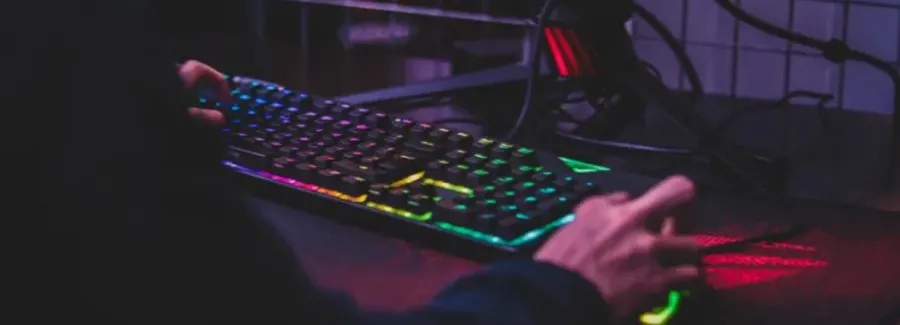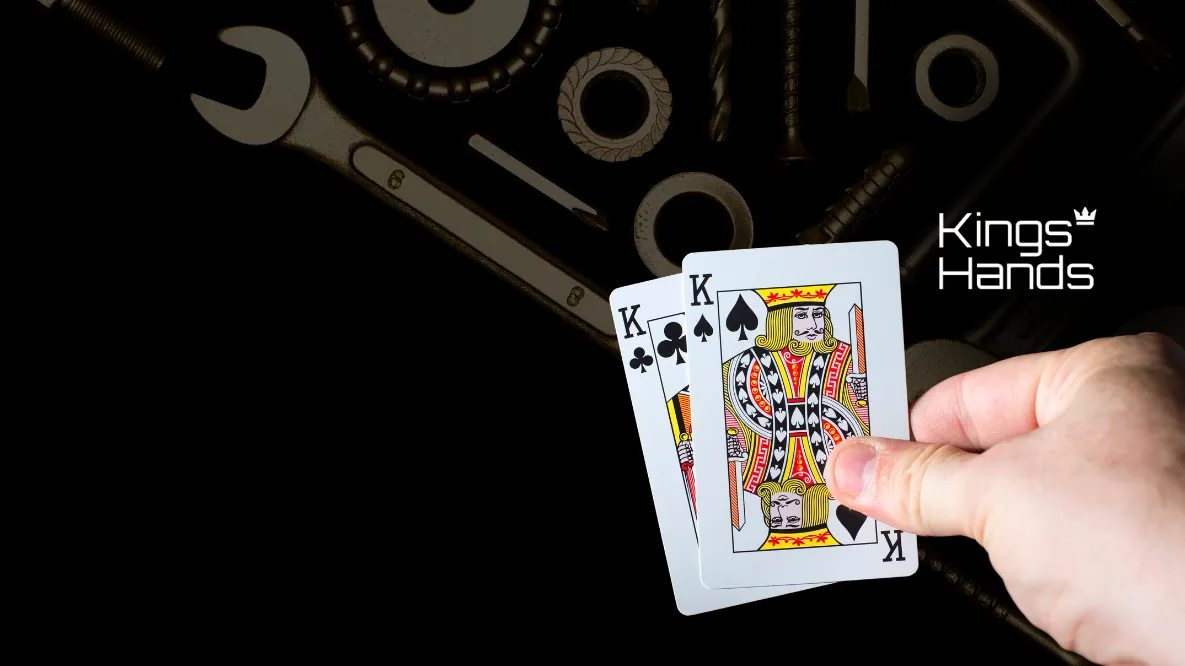Clicking Buttons & How to Do It Best
Some poker wit once remarked that if he could only click exactly the right buttons in precisely the right order he’d win every tournament.
Now of course this isn’t literally true, since no button will ward off bad beats with perfect accuracy. Believe me, if there was such a button I’d be clicking it ‘til my fingers fell off!
Still it does sometimes feel that victory is just a particular set of clicks away, and indeed sometimes it really is.
Online poker is also a seductively easy game to “play” without having a clue what you are really doing, since once you’re seated and dealt cards you really only have a choice between a few big buttons and some sizing sliders. What’s more, you have a time limit to act. This leads to an awful lot of what’s referred to in the game as “button clicking”. Sometimes it even leads to button mashing. Misclicks have been known to occur.
If you just mash your keyboard with the palm of your hand with hotkeys enabled you might just win, but it would be a poor (and mostly short-lived) strategy.
There is something of both an art and a science to figuring out which buttons to click in which order to win at online poker, and here at PokerDeals we are ready to help you with this challenge.
If you’ve been reading along from the start, you’ll know that this series of articles is aimed at bringing your game up to a solid standard, such that you can beat the low stakes, understand what’s required to progress up to battling some tougher fields, and know better how to improve yourself through your own study.
The first step is getting some sense of when to bet, understanding why it is we are betting when we do so, and knowing what ranges to use in certain spots preflop.
Why we Sometimes Click the Wrong Buttons
In truth there are all sorts of reasons we click the “wrong” or sub-optimal buttons in a poker game, and we’ll just go over a few of the most common sources of error in this snap guide.
- We don’t really know why we are betting (we’ll explore this one further below)
- We are annoyed or angered by something that happened earlier (in poker lingo, we are tilted)
- We have lost concentration or are tired, distracted or bored
- We are misinterpreting either a strategic element of the game or the thinking of our opponent
- We fold because we are scared to risk losing our stack. We should always try to be risk neutral in our poker decision making, not risk averse or attracted, and to take measured risks
- We are trying to implement something we have studied into our game but we don’t really understand it well enough yet, or how to implement it properly
- We are not thinking through a spot in enough depth and are playing on auto-pilot
- We are over-thinking a certain spot and coming to an unrealistic conclusion
- We are over-valuing or under-valuing the payouts
- We are experimenting! This is an important part of learning, we should be experimenting!
That’s a Long List (On Making Mistakes)
It is a long list, and it’s very important to stop and point out at this stage that there is nothing wrong with clicking the wrong buttons. It is literally impossible to learn without making mistakes.
As PokerDeals’ Head Coach I promise that you, I and every other poker player on the planet, with the possible exception of Tom Dwan, will make a ton of mistakes at the poker table. Tom has made plenty too, he just got them all out of the way back in 2005.
Kidding aside, making mistakes is nothing to be ashamed of. Being ashamed, on the other hand, is something to be deeply ashamed of. The best approach is to forgive yourself entirely for your past mistakes while applying a rigorous and detailed scrutiny to what those mistakes were and how to best avoid them in future.The question is not how many mistakes we will make, but how quickly we can capitalize on those mistakes by learning from them, improving ourselves based on that learning and moving on to make ever more advanced mistakes against tougher opponents as we move up and beat each stake.
Knowing Why We are Betting
When you’re betting in poker you should always know why.
There are actually a decent variety of reasons we might have for betting or raising in a hand of No Limit Hold’em, the most common of which we’ll run over here.
It may also be useful to divide this discussion into preflop and postflop betting.
Clicking Buttons Preflop
Preflop, we should first run over why it is that open-limping (putting in the minimum amount) is rarely a good idea, in comparison with either opening the pot with a raise or folding. Any aggressive action preflop counts as a raise, not a bet, since the blinds are considered the first bet.
Poker is really a game of aggression, since raising can yield a multitude of benefits which limping cannot really muster.
In short, when we raise pre we create initiative with which to control game flow postflop, we can create fold equity (the chance to win money preflop when everyone folds), and we can charge players to continue to the flop in order to realize their equity, making it harder for them to profit against us. Passive play has its place in poker, but its place is rarely first in preflop.
Hence when we open a hand first in preflop (meaning everyone has folded in front and it is on us to act), we are generally either opening very strong hands or fairly strong hands, and it is rare that we will open a pure trash hand such as T2o or 52o. The range of hands we’ll be able to open will depend most of all on our position, and you can read more about precisely delineating this range in our upcoming article on preflop opening ranges for cash games.
When someone else has already opened the pot, however, it’s a very different scenario. For starters we must likely continue with a tighter range than we would open the pot with if it had folded round to us, since there is another interested party in an earlier position to us. We can still opt to either fold, flat call or 3bet raise, depending on a range of factors including our specific holding.
In cash game poker it is generally advisable to only flat call when on the Button (BTN) or in the Big Blind (BB), due to the danger of getting 3bet squeezed by opponents behind.
In tournaments, which tend to be less aggressive, 9-handed more often, and also feature antes, it is still regarded as normal to have a flat calling range in every seat, as well as mixing in 3bets of course.
Out of the Small Blind it’s certainly going to be best to have at most a very limited number of flat calls facing an open raise, since we’re out of position to every possible seat at the table. This means we’re often better off attempting to take control of the pot aggressively, or getting out of there.
The Small Blind (SB) is also, interestingly, the only seat in which, in tournament poker, we can develop an open limping strategy, in fact it’s going to be best at many stack depths to predominantly limp. This is because of the frequency with which the Big Blind (BB) will check back, the wide ranges employed by both seats, and the fact that we’re in for half a big blind already, and the chance we have to see a pot without investing much more in a tricky seat.
It is best not to do this in cash game poker, since rake is only applied (on most sites) once a flop is seen, so there’s a hard-wired disadvantage to rarely taking down pots preflop.
Clicking Buttons Postflop
Simply put, the deeper the stacks, the more complex the lines of action can become postflop, and the more complexity there is to the gameplay which can occur. This is ultimately why the best players in the world are deep stacked cash game players, and why it is easier for a cash gamer to transition to tournament poker than vice versa.
That’s not to say that tournaments are easy, or particularly simple, and they involve a huge amount of learning ranges at different stack depths which cash poker largely does not, but the postflop situations are in many cases simply less complex simply due to being shorter stacked.
There’s a huge amount that can be said about playing postflop, and it’s a long learning curve. We’re running a series of articles on the subject, taking it blow by blow.
For the purposes of today’s topic let’s just note a few salient points on the subject.
- Understand game flow – the player who last raised preflop has initiative and it is “normal” to allow them the chance to continue on the flop, so you will rarely see opponents leading out (betting into a player who has initiative) on the flop
- Although leading out can be a strategy that makes sense, it is hard to build such strategies and they are best avoided whilst learning a solid tight aggressive game initially
- Getting heads up to the flop will give you your best chance to capture equity (read: win the hand most often)
- You can generally play heads up pots more aggressively than three-way pots
- Just because you have initiative doesn’t mean you must bet on the flop – sometimes a check will be better
- Understand the reasons for your bet on any street – see our “Reasons for Betting” section below – are you bluffing, value betting, denying equity, setting up a multi-street plan?
- Have a plan for what you intend to do if called, on a variety of cards that can come on future streets. Have a plan for what you intend to do if raised.
- Plans can be flexible, and change with new information, but we should always have a plan (and hopefully a good one!)
Reasons for Betting
Understand what outcome you are seeking with your bet.
Let’s go over the basic categories. Each of these deserve its own article, which you’ll find elsewhere in our collection.
Value bets are bets made in the hope of being called by a worse hand.
If you’re making a value bet, what possible hands do you think your opponent will call you with? Are there enough of these hands compared to the hands which the villain will call or raise you with which beat you?
Bluffs are bets made in the hope of getting a better hand (or a hand with equity to hit a superior hand later) to fold. If we are bluffing, what better hands do we hope to fold out with our bluff? Are there enough of these hands, and will they really fold (and to what sizing will they fold?). These are all key considerations when bluffing.
When starting out in poker, don’t overdo it on the bluffing front, at least don’t bluff simply wildly. Try to look for spots where your opponent seems weak, has shown no interest in the pot, or where they are unlikely to have connected with the board (given your assumptions drawn from observing their play).
Blocker hands can present good spots to bluff in some cases. These are hands where you are holding a card your opponent needs to make the nuts (like the Ah when four hearts are out).
There are other reasons for betting which don’t fit neatly into these categories, but when starting out in the game it’s a very decent notion to ask yourself the following questions in each case that you want to bet postflop:
Am I betting for value or as a bluff? If the former, what worse hands will call me? If the latter, what better hands will fold?
A common reason for betting which is a bit of a hybrid reason is the semi-bluff, in which we are betting with a big drawing hand which can improve if our opponent does decide to call. Semi-bluffs rely on future cards to give us equity later, and folds to give us some equity right now, and hence they can never be delivered on the river. They are often fairly indifferent to whether they are called or not, since they can gain equity either way.
Another bet which doesn’t fit easily into either category is a spot where you have for example A3o as the preflop aggressor heads up in position and see a JJ2 board. If betting here you may not get worse hands to call all that often, nor better hands to fold, but betting tiny might still make sense, to fold out some worse hands which can improve and move ahead of us on the turn, such as T7s.
This is a pretty subtle point, and you needn’t worry overly about these special cases for now. Just for the record, this concept is known as denying equity.
Takeaways
Before I get up too big a head of steam, let’s get off the poker train at this waystation and admire the view. It’s easy to get overwhelmed with an information overload in early days poker study.
Something which helped me a lot in my early career was trying to ask the right sorts of questions of myself whenever I was in a hand, as if another person had asked me. So we’ll round out today’s article with a series of these questions.
If you’re asking these things in-game, even if you haven’t yet figured out the best answers, you’ll be a big step ahead of most players you encounter in the lower stakes.
- What am I trying to achieve with my bet? Am I bluffing or value betting?
- What is my plan for the rest of the hand? How often will I continue to value bet / bluff? On which cards will I do so?
- Would a check work better here? What would happen if I checked here? What is my plan when checking?
- What range of other hands would I make this same play with? What bluffs would I make / value bets would I make?
- What range of hands do I put villain on in this spot (based on his previous actions in the hand)?
- Do I have any reads on this player from earlier in the game?
- What is my image in the villain’s eyes?
- Am I telling a consistent story with my betting line?
As your game progresses, you’ll gradually go from asking such questions of yourself while perhaps feeling ill-equipped to give precise or confident answers, to having a very detailed sense of what you are doing or why. But it all starts right here, with talking about clicking buttons, and with asking questions, and attempting to find good answers.
Now go click some buttons!
Here’s one for starters – join the PokerDeals Discord and speak with our pros directly.





















